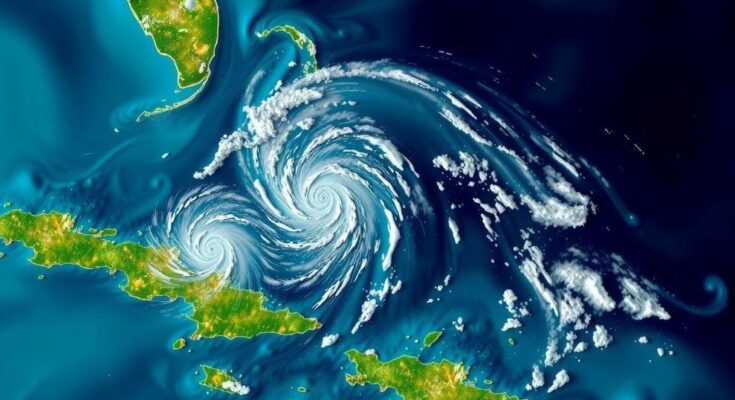Hurricane Rafael, currently a Category 2 storm, is moving toward Cuba, with prospects of intensification. The Florida Keys are under a tropical storm warning, but risks for Florida are low. A separate tropical disturbance near Haiti is also being monitored for potential development in the upcoming week.
On Wednesday morning, Category 2 Hurricane Rafael approached western Cuba with maximum sustained winds of 110 mph, threatening to intensify into a major hurricane before landfall. The storm is anticipated to weaken as it navigates through the Gulf of Mexico due to adverse conditions such as high wind shear and cooler waters. Although the Florida Keys are under a tropical storm warning due to possible outer bands, the likelihood of sustained tropical-storm-force winds in South Florida has significantly diminished to below 1%. Meanwhile, forecasters are monitoring another tropical disturbance developing north of Haiti, with potential impacts expected in the coming days. As of a recent update from the National Hurricane Center, Hurricane Rafael was forecasted to move northwest at 14 mph and was positioned approximately 130 miles south-southeast of Havana, Cuba. The National Weather Service has projected that up to an inch of rain may impact Florida through Thursday, although the storm’s future intensity remains uncertain. Meteorologists emphasized, “There is larger-than-normal uncertainty regarding Rafael’s intensity later in the forecast period,” highlighting the unpredictability associated with the storm’s trajectory as it enters the Gulf region. On a broader scale, additional concern exists regarding a developing tropical disturbance near Haiti, which has a 30% likelihood of evolving into a tropical depression within the next week. Forecasters have noted, “Some gradual development of this system is possible toward the end of the week and into the early part of the weekend,” suggesting impacts could extend toward the Virgin Islands and Puerto Rico as it progresses toward the Southeast Bahamas. The evolving nature of these storms exemplifies the complexity and volatility of hurricane forecasting in the Caribbean region.
The occurrence of hurricanes is a significant issue in the Caribbean, particularly during the Atlantic hurricane season which spans from June to November each year. The National Hurricane Center plays a critical role in monitoring and providing updates about storm systems that threaten the region, facilitating timely preparations for residents in vulnerable areas. Hurricane Rafael, designated as a Category 2 hurricane, exhibits characteristics typical of such storms, including potential for rapid intensification and the impact of environmental factors like wind shear and sea temperatures on its strength as it moves over different regions. Such storms notably affect the infrastructure and power systems of islands, which can lead to prolonged outages, particularly given the current vulnerability of Cuba due to recent power challenges. Furthermore, the emergence of potential new systems illustrates the ongoing threats posed by the Atlantic hurricane season, necessitating heightened awareness and preparedness.
In summary, Hurricane Rafael is currently making its way towards Cuba, with expectations that it could strengthen to a major hurricane before landfall. While the immediate risk to the Florida Keys remains, the likelihood of severe impacts on the mainland has greatly decreased. Additionally, authorities are keeping a watchful eye on another disturbance that may develop in the Caribbean, underscoring the ongoing risks posed by tropical systems this season. As the patterns of these storms evolve, they highlight the importance of continuous monitoring and public preparedness.
Original Source: www.miamiherald.com




